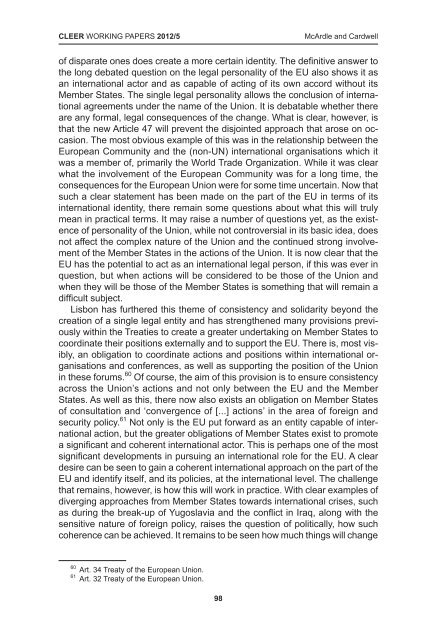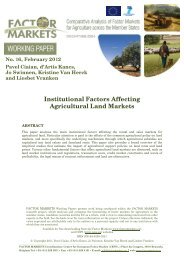Principles and practices of EU external representation - Asser Institute
Principles and practices of EU external representation - Asser Institute
Principles and practices of EU external representation - Asser Institute
Create successful ePaper yourself
Turn your PDF publications into a flip-book with our unique Google optimized e-Paper software.
CLEER WORKING PAPERS 2012/5McArdle <strong>and</strong> Cardwell<strong>of</strong> disparate ones does create a more certain identity. The definitive answer tothe long debated question on the legal personality <strong>of</strong> the <strong>EU</strong> also shows it asan international actor <strong>and</strong> as capable <strong>of</strong> acting <strong>of</strong> its own accord without itsMember States. The single legal personality allows the conclusion <strong>of</strong> internationalagreements under the name <strong>of</strong> the Union. It is debatable whether thereare any formal, legal consequences <strong>of</strong> the change. What is clear, however, isthat the new Article 47 will prevent the disjointed approach that arose on occasion.The most obvious example <strong>of</strong> this was in the relationship between theEuropean Community <strong>and</strong> the (non-UN) international organisations which itwas a member <strong>of</strong>, primarily the World Trade Organization. While it was clearwhat the involvement <strong>of</strong> the European Community was for a long time, theconsequences for the European Union were for some time uncertain. Now thatsuch a clear statement has been made on the part <strong>of</strong> the <strong>EU</strong> in terms <strong>of</strong> itsinternational identity, there remain some questions about what this will trulymean in practical terms. It may raise a number <strong>of</strong> questions yet, as the existence<strong>of</strong> personality <strong>of</strong> the Union, while not controversial in its basic idea, doesnot affect the complex nature <strong>of</strong> the Union <strong>and</strong> the continued strong involvement<strong>of</strong> the Member States in the actions <strong>of</strong> the Union. It is now clear that the<strong>EU</strong> has the potential to act as an international legal person, if this was ever inquestion, but when actions will be considered to be those <strong>of</strong> the Union <strong>and</strong>when they will be those <strong>of</strong> the Member States is something that will remain adifficult subject.Lisbon has furthered this theme <strong>of</strong> consistency <strong>and</strong> solidarity beyond thecreation <strong>of</strong> a single legal entity <strong>and</strong> has strengthened many provisions previouslywithin the Treaties to create a greater undertaking on Member States tocoordinate their positions <strong>external</strong>ly <strong>and</strong> to support the <strong>EU</strong>. There is, most visibly,an obligation to coordinate actions <strong>and</strong> positions within international organisations<strong>and</strong> conferences, as well as supporting the position <strong>of</strong> the Unionin these forums. 60 Of course, the aim <strong>of</strong> this provision is to ensure consistencyacross the Union’s actions <strong>and</strong> not only between the <strong>EU</strong> <strong>and</strong> the MemberStates. As well as this, there now also exists an obligation on Member States<strong>of</strong> consultation <strong>and</strong> ‘convergence <strong>of</strong> [...] actions’ in the area <strong>of</strong> foreign <strong>and</strong>security policy. 61 Not only is the <strong>EU</strong> put forward as an entity capable <strong>of</strong> internationalaction, but the greater obligations <strong>of</strong> Member States exist to promotea significant <strong>and</strong> coherent international actor. This is perhaps one <strong>of</strong> the mostsignificant developments in pursuing an international role for the <strong>EU</strong>. A cleardesire can be seen to gain a coherent international approach on the part <strong>of</strong> the<strong>EU</strong> <strong>and</strong> identify itself, <strong>and</strong> its policies, at the international level. The challengethat remains, however, is how this will work in practice. With clear examples <strong>of</strong>diverging approaches from Member States towards international crises, suchas during the break-up <strong>of</strong> Yugoslavia <strong>and</strong> the conflict in Iraq, along with thesensitive nature <strong>of</strong> foreign policy, raises the question <strong>of</strong> politically, how suchcoherence can be achieved. It remains to be seen how much things will change60 Art. 34 Treaty <strong>of</strong> the European Union.61 Art. 32 Treaty <strong>of</strong> the European Union.98








